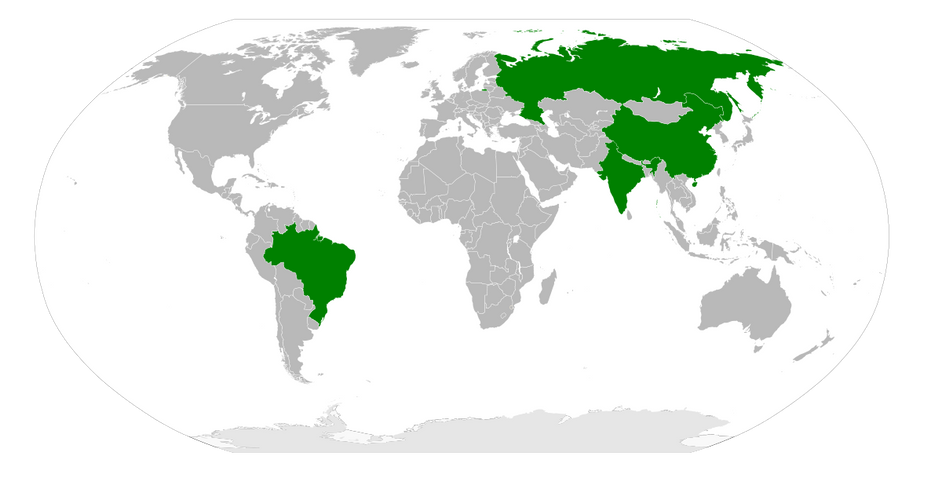22.09.2021
A New Brick in BRICKS: Should Egypt join or not?
Introduction
The BRICS group, consisting of Brazil, Russia, India, China, and South Africa, has emerged as a formidable force in the global economic and political landscape. Since its inception in 2006, BRICS has been recognized for its potential to reshape international relations. While BRICS has traditionally been seen as a group dominated by emerging economies, the idea of expanding its membership has been a topic of discussion for some time. One of the most intriguing propositions in recent years has been Egypt's interest in joining the BRICS group. This article explores the potential implications of Egypt becoming a member of BRICS, considering economic, political, and strategic aspects.
Economic Implications
-
-Economic Growth and Investment Opportunities: Egypt's accession to BRICS could bring significant economic benefits to both parties. The existing BRICS nations are known for their robust economic growth, and Egypt's inclusion could further strengthen this bloc. For Egypt, it would mean access to a broader market and increased foreign direct investment (FDI) opportunities.
-
-Trade Expansion: Joining BRICS could boost Egypt's trade relations with its new partners. The BRICS nations collectively represent a substantial portion of the world's population and GDP, making them a lucrative market for Egyptian goods and services. Increased trade could stimulate economic growth and job creation in Egypt.
-
-Infrastructure Development: BRICS has shown a commitment to infrastructure development through initiatives like the New Development Bank (NDB). Egypt's participation in BRICS could lead to increased funding for infrastructure projects, helping modernize the country's transportation, energy, and telecommunications sectors.
-
-Energy Cooperation: Egypt is strategically located in the Eastern Mediterranean, making it a crucial player in regional energy dynamics. BRICS membership could facilitate energy cooperation between Egypt and other BRICS countries, potentially securing more stable energy supplies for the group and fostering energy infrastructure development in Egypt.
Political Implications
-
-Global Influence: Egypt's inclusion would bolster BRICS' geopolitical influence, especially in the Middle East and Africa. It could enhance the group's ability to mediate in regional conflicts and contribute to peace and stability.
-
-Counterbalance to Western Influence: BRICS has often sought to counterbalance Western dominance in global affairs. Egypt, with its historical significance in the Arab world and Africa, could provide a stronger voice to this cause and diversify the group's diplomatic and political reach.
-
-Alignment on Key Issues: Egypt shares several key policy objectives with BRICS members, including a commitment to multipolarity, opposition to unilateralism, and support for international institutions like the United Nations. These shared values could strengthen the group's collective stance on global issues.
Strategic Implications
-
-Security and Defense: Egypt's military capabilities and regional strategic importance could enhance BRICS' security and defense capabilities. This might lead to greater cooperation in combating terrorism, piracy, and ensuring maritime security in key waterways like the Suez Canal.
-
-Strengthening the South-South Cooperation: BRICS has often championed South-South cooperation as a means of addressing global challenges. Egypt, with its extensive experience in the Non-Aligned Movement and the African Union, could contribute to fostering stronger South-South partnerships within BRICS.
-
-Regional Stability: Egypt's participation in BRICS might lead to a more concerted effort to address regional conflicts in the Middle East and North Africa. BRICS could play a role in mediating disputes and promoting peace, aligning with Egypt's historical role as a mediator in the Arab-Israeli conflict.
Challenges and Concerns
-
While there are potential benefits to Egypt joining the BRICS group, there are also legitimate fears and concerns that should be taken into account:
-
-
-Economic Disparities: One of the primary concerns is the significant economic disparity between Egypt and the existing BRICS members. Egypt's economy is smaller and less developed in comparison. This could potentially lead to unequal benefits, with the larger BRICS nations dominating economic decisions and leaving Egypt at a disadvantage.
-
-Divergent Interests: BRICS members have diverse economic and political interests. Egypt's entry could lead to differences in priorities and strategies, potentially causing internal conflicts within the group. Balancing the interests of Egypt with those of the existing members might be challenging.
-
-Geopolitical Complexities: Egypt's existing regional alliances and foreign policy could introduce geopolitical complexities. For example, Egypt maintains a significant relationship with the United States and has a peace treaty with Israel. These relationships might conflict with some of the broader BRICS goals or lead to tensions within the group.
-
-Impact on Existing Members: The addition of a new member, especially one with a large population like Egypt, could dilute the influence and decision-making power of existing BRICS members. This may lead to resistance from some members who fear a reduction in their own influence.
-
-Resource Allocation: BRICS has established initiatives like the New Development Bank (NDB) to fund infrastructure and development projects. Concerns may arise about how resources are allocated among member states, with fears that Egypt could receive a disproportionate share of funding, leaving less for the existing members.
-
-Regional Competition: Egypt's membership in BRICS might be viewed with suspicion by other regional powers in the Middle East, potentially leading to increased competition and tensions in the region.
-
-Complex Foreign Policy Challenges: Egypt's foreign policy is multifaceted, with involvement in various regional issues, including conflicts in the Middle East and North Africa. BRICS membership might require Egypt to balance these commitments with the priorities of the group, which could be challenging.
-
-Political Alignment: While there are shared values and principles between Egypt and BRICS, there may be concerns about the alignment of Egypt's political interests with those of BRICS in the long term. Shifts in government or policy in Egypt could impact the group's dynamics.
-
-Trade Imbalances: There is a risk of trade imbalances between Egypt and existing BRICS members. Egypt might not have as much to offer in terms of goods and services, potentially leading to trade deficits and economic challenges.
-
-Coordination Challenges: Expanding the BRICS group with a new member introduces coordination challenges. It may become more difficult to reach consensus on important issues as the number of stakeholders increases.
Conclusion
Egypt's potential membership in the BRICS group holds significant promise for both Egypt and the existing BRICS nations. It could lead to economic growth, political influence, and strategic advantages. However, it also presents challenges that need to be addressed to ensure a harmonious and productive partnership. Ultimately, Egypt's entry into BRICS would be a significant development in the evolving global geopolitical landscape, with the potential to reshape international relations in the years to come. As discussions continue, it will be crucial for all parties involved to carefully consider the implications and opportunities that such a move would bring.



